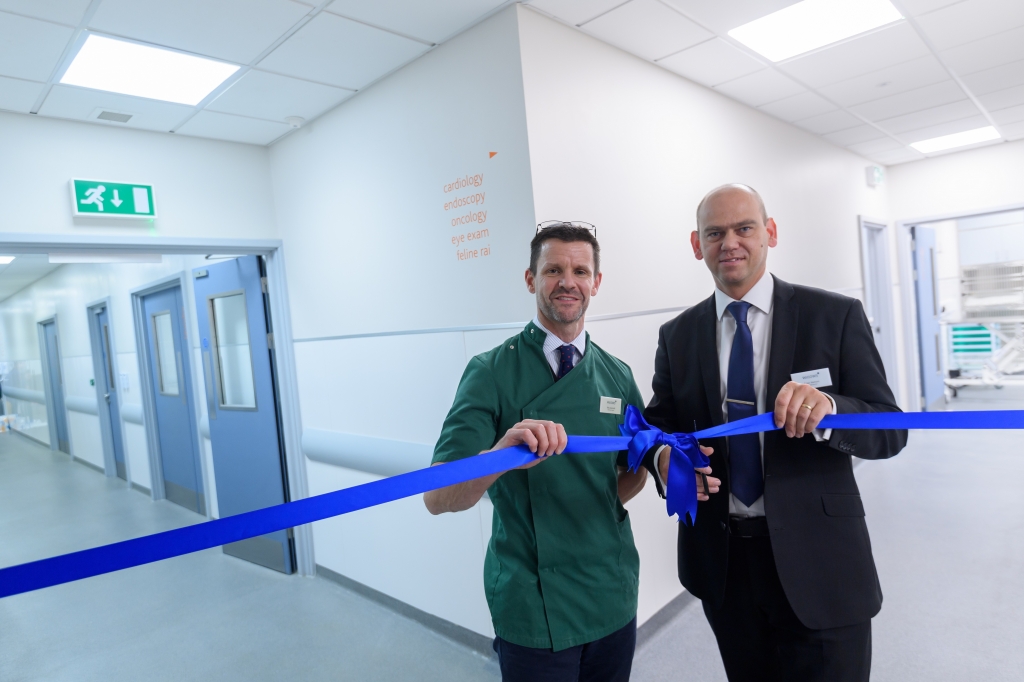
Willows clinical director Toby Gemmill, left, and hospital director Brian Watson open the RAI unit
SPECIALISED FELINE TREATMENT UNIT OPENS AT WILLOWS VETERINARY CENTRE
A new specialised unit to treat cats with an overactive thyroid has been launched at the state-of-the-art Willows Veterinary Centre.
The Solihull-based practice is among just a few centres in the UK to use radioactive iodine (RAI) therapy, which has, on average, a 95 per cent success rate in treating cats with hyperthyroidism.
Willows’ Stephanie Lalor, a leading international specialist in feline medicine, said the centre’s new RAI unit has already treated its first case, Snowy the 13-year-old domestic short hair, who was admitted after initially being diagnosed with hyperthyroidism in August 2017.
She said: “The new therapy is non-invasive and is the gold standard of treatment for cats with hyperthyroidism. It is safe and highly effective and a single injection can be curative. Patients do need to be screened for their suitability and ideally they are treated with medical therapy prior to the RAI.
“Snowy’s treatment went well and she was discharged at the end of December 2017. Due to the radioactive nature of the treatment, patients must stay with us for 15 days after the injection.
“Our patients stay in luxury cat condos during their hospitalisation and their day-to-day care is over-seen by our lead radioactive iodine nurse, Vicky Maund. While with us, Snowy gained weight and her thyroid hormone level was back to normal upon discharge.”
Snowy’s owner Maria Mannion, a student veterinary nurse at Willows, said: “Snowy’s doing really well at home and is gaining her weight back already. She’s back to her old happy self and I can’t thank Stephanie and the medicine nurses enough for all their hard work.”
An overactive thyroid is a common endocrine disorder in cats, of which common symptoms can include increased appetite, weight loss and hyperactivity.
Left untreated, the clinical signs can be quite dramatic, however, most cats will respond well to treatment.
The new unit is part of a £1 million investment in Willows, which is part of the Linnaeus Group, which includes a dedicated operating theatre for minimally invasive procedures, a range of specialist treatment rooms and more than 40 new kennels.
Toby Gemmill, clinical director at Willows, said: “We are already extremely well placed to offer a wide variety of specialist treatments and this extension has provided us with the space to expand our services further. The new radioactive iodine unit is very exciting and allows us to build on our gold level cat-friendly clinic status.”
Willows offers a 24-hour service to clients and specialises in cardiology, dermatology, internal medicine, neurology, oncology ophthalmology, orthopaedics, imaging, anaesthesia and soft tissue surgery.
To find out more about Willows Veterinary Centre, the RAI unit and its specialist teams, visit www.willows.uk.net.
More from Linnaeus Group
- Mars Veterinary Health publishes 2025 Science Impact Report highlighting global advances in pet health
- AMVS specialist gets to heart of puppy's problem
- Garston Veterinary Group team earn BVRA recognition
- Chihuahua Lola loving life after 'challenging' spinal surgery
- Vets save therapy cat's life following road accident

 8 years ago
8 years ago  2422 views
2422 views